2017-2018 Student of the Week Profiles
Alondra Martin ortiz
Our final “Student of the Week” for Spring 2018, Alondra Martin Ortiz, has had a rigorous
road to her Honors medallion. As a Biology major balancing a 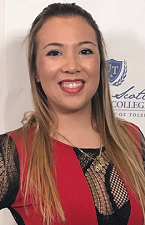 Chemistry minor, she joins countless others on the road to medical school – though
her decision to pursue this career has a distinctly personal meaning.
Chemistry minor, she joins countless others on the road to medical school – though
her decision to pursue this career has a distinctly personal meaning.
Has pre-med always been the plan?
Around 2013, the summer between my junior and senior year, is when I decided. I was
diagnosed with an autoimmune disease – Behcet’s Syndrome. It is a syndrome where your
body cannot distinguish between healthy and unhealthy cells, so it attacks healthy
cells. That triggered the decision. It really helped me see what a patient goes through
and how much we need doctors in our communities. Through that experience, I decided
I wanted to be a pediatric rheumatologist.
How would you say your experience as a pre-med student differed from those without
the concentration?
I had the opportunity to participate in the UT-Salford Exchange Program in England
for pre-med students. That was great! I was able to spend the entire year with other
pre-med students that were in the same boat, all taking the MCAT or studying for it.
It was nice to be surrounded by a group of people who have similar expectations and
next steps as you. We were able to travel the world while experiencing all those things
together, so it was great.
Is school in the U.K. different from school in the U.S.?
It’s very different. For example, my Salford Biochemistry class lasted a whole year.
We didn’t have quizzes or homework assignments, just a comprehensive final exam. “Finals
week” lasted for three weeks! We only had a lecture once a week, and when we had a
lab we didn’t have a lecture. I had a lot more time, but I still learned a lot that
year.
What is the topic of your Honors capstone?
I was working with C. elegans (microscopic worms) and their muscle attachment. It’s relevant to humans in that
our skin has layers, with our muscles attached to our skin, helping our movement.
In the worms, we were studying a mutation that affects this attachment and then the
subsequent muscle collapse. Once the muscle collapses, the worm cannot move.
What are you doing after graduation?
I have accepted a Graduate Assistant position with the Office of Diversity and Inclusion
in the Multicultural Emerging Scholars Program for incoming first-year students.
Where would you like to work?
It’s strange, I should be used to warm weather since I’m from Puerto Rico, but I want
to stay in the Midwest. I enjoy the four seasons here, although it’s currently Spring
and it was snowing like a week ago. For some reason, I enjoy the change in weather!
Collin Tassie
Four years have gone by surprisingly quickly for Honors senior Collin Tassie, who
will be furthering his education at the University of Detroit Mercy in the Fall. Between
his Biochemistry major, RocketTHON, Relay for Life, and much more, the Dundee, MI
native has had a lot on his plate throughout his 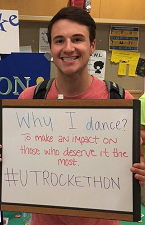 collegiate career. We caught up with Collin before classes let out for the year.
collegiate career. We caught up with Collin before classes let out for the year.
What brought you to your major?
All throughout high school, I wanted to be a dentist. I was always passionate about
it and when I came to UT, I went with my gut! I also shadowed a couple of doctors
in Michigan, and it further revealed how awesome dentistry could be.
What educational path does one take to Dentistry?
Everyone who goes into dental school graduates with their D.D.S., and after that,
you can go into residence programs – including a variety of dental options. I would
either love to be an orthodontist or a cosmetic dentist.
You’re both a part of Relay for Life and RocketTHON. What have been your roles in
those?
For RocketTHON, I have been on a planning committee for a few years and became the
external director this year as well. I was in charge of graphics, social media, and
public relations for the event. For Relay for Life, I was also the external director
and helped out with many of the things that went on for both events!
What Honors College classes have contributed to you success?
HON 1010 and HON 1020 were the first classes I took, and from there, I took a lot
of courses for Honors within my department. Instrumental Analysis, Biochemistry courses,
along with other Honors sections helped further my career and enhance my knowledge
in the field. Using Honors Learning Contracts was also extremely helpful!
How has being an Honors student enriched your UT experience?
Last year, when I went to Nicaragua on a service learning trip with the JSHC, the
experience completely changed my perspective on what community service really means
– what it means to help others. Moving forward into graduate school, I want to stay
active in community service and keep visiting the same destinations I did during my
time as an Honors student.
Shikera Tall
For most, college is a balancing act, trying to keep strong grades in classes while
juggling work and student involvement. Honors senior and Law and 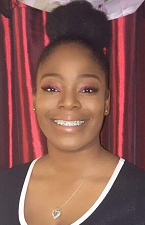 Social Thought major, Shikera Tall, can attest to this. Vice President of the Law
and Social Thought Student Organization while also working full-time, college has
been quite the challenge. Like many students, though, this Jesup W. Scott High School
alumna and soon-to-be Jesup Scott Honors College graduate hasn’t gone it alone. She
is appreciative of support from Dr. Chelsea Griffis, Associate Lecturer in History,
and Dr. Ashley Pryor, Chair of Honors Faculty. But in the end, determination is what
has kept Shikera successful at UT.
Social Thought major, Shikera Tall, can attest to this. Vice President of the Law
and Social Thought Student Organization while also working full-time, college has
been quite the challenge. Like many students, though, this Jesup W. Scott High School
alumna and soon-to-be Jesup Scott Honors College graduate hasn’t gone it alone. She
is appreciative of support from Dr. Chelsea Griffis, Associate Lecturer in History,
and Dr. Ashley Pryor, Chair of Honors Faculty. But in the end, determination is what
has kept Shikera successful at UT.
What brought you into your major?
I always knew that LST is what I wanted to have as my major. I’m going to earn my
J.D. next, hopefully in three years of law school. After that, I want to join the
FBI and work in their Behavior Analysis Unit.
Why not be a lawyer?
I began to think more about being a lawyer, and the idea became boring. It’s a lot
of paperwork, research, and writing. The only exciting thing is practicing in an actual
courtroom, and how often does that happen? The real work is behind the desk, and I
had to ask myself if I wanted to sit behind one for the rest of my life. I don’t want
to waste my young years. I may move on to more stable things after this phase in my
life is over, but for now I want to do something exciting!
You’ve had a full-time job throughout your undergraduate career. What is it like balancing
work and classes?
I never knew what stress was until I got to college. I’ve been doing everything on
my own since before I was eighteen. Having to pay bills and work long hours while
also enrolled in fifteen credits or more a semester has been rough. Determination
and knowing what it can do for my future has been the driving force for me. It is
really hard, but I know what it’s going to bring me. It’s tough to balance it all,
but when you don’t really have a choice, you find ways to get through it.
Many students are in a similar situation. What advice would you give them?
Make sure you’re pursuing a major and a career you really want. If you don’t have
the motivation in both areas, you’re going to slack in one or the other. Because I
refuse to be homeless, but I also refuse to not have an education, the motivation
is there.
What does a Law and Social Thought major do for their Honors thesis?
My Honors thesis concerns victim impact statements, which victims write when a crime
has been committed against them to express how it has affected their lives. In these,
you have the opportunity to influence the nature of the sentence. I look at how that
ties into the criminal justice system in the thesis, determining whether it should
be a factor in sentencing or not. I learned about them firsthand during an internship
downtown in the Victim Witness Office, where I helped victims draft their statements
and then watched them read the statements in court. It is such a moving thing to experience.
Austin Bartos
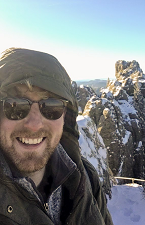 Ever since he was in the fourth grade, Austin Bartos has been fascinated with the
outside world. From science projects to research, the Environmental Science major
was recently accepted into the next phase of his collegiate journey – a Master’s program
at Utah State University.
Ever since he was in the fourth grade, Austin Bartos has been fascinated with the
outside world. From science projects to research, the Environmental Science major
was recently accepted into the next phase of his collegiate journey – a Master’s program
at Utah State University.
What are you hoping to do with your Environmental Science major?
After graduate school, I would love to work in an agriculture extension office trying
to bridge the gap between farmers and producers dealing with water quality. Being
in Toledo with all of our past water problems, the importance of addressing these
issues is personal for me.
What led you to this major?
I have participated in science fairs since fourth grade, and when I did, many of my
projects were environmental. In fact, during my senior year of high school, I competed
in the Science Day at UT. One of the judges, a professor here, said that I should
come check out UT when I was deciding on a university to attend – and now he is my
research advisor! Making that connection was huge for me.
How has the Honors College shaped you?
I definitely prefer the Honors courses over regular ones. It seems like in the JSHC,
the courses are more based in community and discussion. I appreciate that more than
regular courses since you are getting more out of each class meeting. The Honors seminars
have also supplemented my understanding of and skill in disciplines other than the
sciences, which has helped me grow more in other areas. Being in the JSHC has really
helped me foster friendships.
Would you like to eventually work in Toledo?
I think I would ultimately like to come back to Ohio once I finish my Master’s degree
and work around the Great Lakes. It doesn't have to be right in Toledo, but the Great
Lakes region is an important one to preserve for the United States. So working in
that area would be a neat experience.
Colleen Anderson
While justice may be blindfolded, Colleen Anderson is going into her first semester
of law school with clarity and confidence. This Honors senior is feeling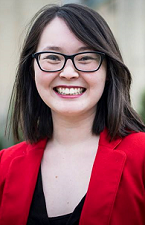 prepared for her next step after spending a semester in the nation’s capital interning
with The Washington Center. Majoring in Paralegal Studies coupled with interning in
the legal field at home and in Washington, D.C. has made Colleen sure of the career
path she wants to follow.
prepared for her next step after spending a semester in the nation’s capital interning
with The Washington Center. Majoring in Paralegal Studies coupled with interning in
the legal field at home and in Washington, D.C. has made Colleen sure of the career
path she wants to follow.
What was The Washington Center like?
I spent all of last semester there and I fell in love with D.C. At the same time,
it made me miss the things I love about Toledo, like being able to go to breakfast
at a diner and not wait an hour for a table. I worked in the D.C. Public Defender’s
Office in the investigative division and helped out with juvenile cases. It was such
a valuable experience and I learned so much. It’s valuable to get out of Toledo to
see what other areas you might like.
Washington can be expensive – was that an issue?
I have the Presidential Scholarship, which usually pays for my tuition, so I applied
that to this experience. The Washington Center gave me a scholarship to cover the
rest of the costs. They are great about helping cover any costs with which you have
trouble. Some of my friends from there and I simply contacted the program and told
them the leftover price we couldn’t cover, and they were happy to help us with it.
What local legal internships have you pursued?
Right now, I’m working at Toledo Municipal Court as an Assignment Clerk and I have
worked as an intern in the Lucas County Prosecutor’s Office before, so I wanted to
try out the Lucas County Public Defender’s Office, too. I definitely liked the former
better, but I’m glad that I at least tried the Public Defender’s office out. I really
enjoyed learning more about both sides of the process.
What Honors class or teacher has influenced your path the most?
This semester I’m taking an Honors seminar called “Law and Literature” with Professor
Jon Richardson and I’ve enjoyed it for a lot of reasons. Professor Richardson teaches
law through a very unique perspective, which I love. The course speaks to me especially
because I adore reading fiction novels – we examine legal practices and norms through
literature in the class. Professor Richardson is also an attorney, so it’s always
great to talk with him about the profession and get advice on things like law school.
Hearing anecdotes from him about his time as a lawyer is so insightful and funny,
too!
What do you plan to do after graduation?
I plan to go straight to law school this Fall. Right now I’m deciding between The
Ohio State University, the University of Michigan, and George Washington University
in Washington D.C.
Maddie Tomczak
Fisheries may not be at the top of many students’ lists of research interests, but
Environmental Sciences major Maddie Tomczak took the bait – hook, line, and sinker.
Looking to make a career out of her research, this Honors student has attended 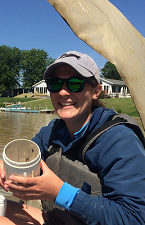 conferences stretching from Milwaukee to Columbus on the topic, and will soon begin
her graduate training in the field. Though her path is now clear, Maddie’s interest
in fisheries started well before she knew what she could do with it.
conferences stretching from Milwaukee to Columbus on the topic, and will soon begin
her graduate training in the field. Though her path is now clear, Maddie’s interest
in fisheries started well before she knew what she could do with it.
What sparked your interest in your work?
I’ve always been interested in fisheries, having grown up fishing and living on Lake
Erie. I joined the American Fisheries Society student subunit at UT as a sophomore.
One of the graduate students I was working with suggested I do so, and it’s led to
a lot of great opportunities. Attending conferences has shown me what’s going on in
the Midwest and nationally. It’s been an interest all my life, I just didn’t know
what I could with it.
Can you talk a little bit about your research?
Last spring, I started working for a graduate student in our department on the early
development of whitefish. Over the summer of 2017, I was hired with the Ohio Department
of Natural Resources as a grass carp technician. We are tracking the spawning of grass
carp in the Sandusky River, so we went out on a boat and sampled for eggs with bongo
nets and light trap surveys. What I’m looking at is their development from the spawning
ground to the river mouth; if they go into the Sandusky Bay before they’re developed,
they’ll most likely die. It’s actually the topic of my Honors thesis.
How did you choose your advisor?
Dr. Christine Mayer is the faculty advisor for the subunit of the AFS group. She also
works closely with the DNR and introduced me to my internship last year – so she’s
been really helpful.
You’re a senior – what are you looking to do after graduation?
I just accepted a position for graduate school at Western Illinois University. I’ll
be working on age and growth structure of bighead as well as silver carp, which are
Asian carp species in the Illinois River. I’ve also been hired over the summer to
help out with other projects.
What is your dream job?
Right now, I would like to work for a state or federal agency. I’m not sure if I want
to get my Ph.D. yet, but that could be another option. Everything is kind of up in
the air right now!
You’re also going to Trinidad in May. What will you be doing there?
We’re going for ten days and will hike waterfalls, explore a bat cave, and tour the
different ecosystems. It’s really exciting because I’ve known the professor we’re
traveling with since freshman year, so I’ve been hearing about the trip for years
at this point!
Ralph Palad
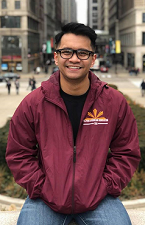 The summer between 8th and 9th grade, Honors student Ralph Palad’s father sat him down and asked what he wanted
to do with his life. Ralph wasn’t sure at the time, but with a recommendation from
his father, the Electrical Engineering major started down the career path of a computer
engineer. With graduation on the horizon, he looks back on his time at UT with pride.
The summer between 8th and 9th grade, Honors student Ralph Palad’s father sat him down and asked what he wanted
to do with his life. Ralph wasn’t sure at the time, but with a recommendation from
his father, the Electrical Engineering major started down the career path of a computer
engineer. With graduation on the horizon, he looks back on his time at UT with pride.
How has the Honors College enhanced your experience through your major?
I’ve gotten to work with other talented students in the JSHC through Honors courses.
Just being able to work with and bounce ideas off each other is great. For instance,
my Senior Design group were all Honors students. We worked on cool things like a GPS-guided
mailbox drone. The JSHC got me thinking about out-of-the-box projects and allowed
me to work with people that pushed me to become a better student.
You had to do a co-op. What was that like?
I actually had four official co-ops – five unofficially. My first one was the summer
after freshman year with Pepperl+Fuchs, working as an IT Support Technician. Now,
I’m working with Rockwell Automation out of Cleveland, OH. I’ve been working with
them for three rotations now. They’ve given me the opportunity to work remotely while
taking classes. I love it! I get to be on a team with other engineers and they’ve
treated me as if I was one of them. They didn’t give me any ridiculous projects; they
gave me stuff that pushed me and expanded my knowledge of engineering.
Has working while in classes presented any problems?
Not at all. I get to make my own schedule, so at the beginning of the week I look
at when I am I busy – when my classes are and where my free time is. After I figure
that out, I send my schedule to my boss. While I’m sitting, waiting for my next class,
I can open up my laptop and work.
With graduation coming up, do you think you will work for your current co-op?
I got a job offer from them prior to this academic year! They flew me out to headquarters
and had me begin an Engineer in Training program. The position I’m going for is a
“Field Support Engineer,” going to customer sites and supporting our products. It’s
a yearlong program. Once the program is over, I get to have input on where I want
to go. It could be anywhere in the world, but it all depends on the need – hopefully
our headquarters in Milwaukee or California.
Allison Grim
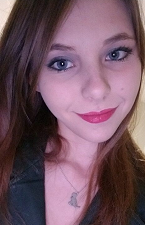 As we close on our first week back from Spring Break, Honors students like Allison
Grim are still readjusting to their weekly schedules. Last week, the Honors College
hosted three trips abroad to the Galápagos Islands, Guatemala, and Nicaragua. Allison
took part last year in the trip to the Galápagos, where she studied the one-of-a-kind
ecosystem. This year, she took part in a service learning trip to Guatemala, helping
to build a home for a family. As a pre-med sophomore majoring in Biology, Allison
feels these kinds of experiences are important to prepare for her career. We were
able to speak with Allison during her time south of the border.
As we close on our first week back from Spring Break, Honors students like Allison
Grim are still readjusting to their weekly schedules. Last week, the Honors College
hosted three trips abroad to the Galápagos Islands, Guatemala, and Nicaragua. Allison
took part last year in the trip to the Galápagos, where she studied the one-of-a-kind
ecosystem. This year, she took part in a service learning trip to Guatemala, helping
to build a home for a family. As a pre-med sophomore majoring in Biology, Allison
feels these kinds of experiences are important to prepare for her career. We were
able to speak with Allison during her time south of the border.
Your first Honors Study Abroad trip was last year to the Galápagos Islands. Tell us
a little bit about that.
The purpose of it was to see the effects of ecotourism on the environment. Most of
us were Biology majors, not necessarily with an environmental concentration, but it
was still cool to see one of the most biodiverse places in the world. On one of our
trips on the boat, we saw around forty dolphins swimming in a line!
Currently you’re on the Honors service learning trip to Guatemala. How is that going?
It’s wonderful! I’ve never done a service trip like this. I’ve been passionate about
volunteering for a long time. I was involved in the Toledo Zoo Teens program for six
years, which was a great experience, but this kind of service is dramatically different.
I’ve never seen this kind of poverty up close and personal, so this is a new experience
for me.
How would you describe the culture in the country?
The people here are very happy. They don’t have much, so I feel like they appreciate
the little things. I saw a little girl at our worksite playing with half of a toothpaste
tube, and she was completely content with it. At home, kids will freak out if they
don’t have an iPad in front of them.
Do you feel your experience on these trips has prepared you for your career?
Definitely. Seeing the poverty in the Galápagos and Guatemala has prepared me for
seeing similar issues in the medical field.
Ashley Diel
Honors senior, Ashley Diel, has literally been around the world and back again. From
Jordan to Ghana and London to Managua, this Communication major has taken advantage
of all that UT and the Honors College has had to offer in traveling overseas. By the
time this article reaches you, Ashley will have just 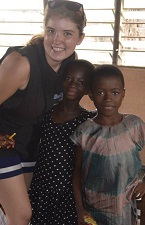 returned from yet another trip to Ghana, only days before embarking on her Honors
Study Abroad trip to Guatemala. With graduation a near vista, Ashley hopes to ultimately
join the Peace Corps – a desire thoroughly shaped by her undergraduate travel.
returned from yet another trip to Ghana, only days before embarking on her Honors
Study Abroad trip to Guatemala. With graduation a near vista, Ashley hopes to ultimately
join the Peace Corps – a desire thoroughly shaped by her undergraduate travel.
What pushes you to study abroad?
I think it’s interesting seeing other cultures, especially ones vastly different from
those found here in the United States. My future career will most likely be working
with other cultures, particularly in the Middle East, which is quite different from
the U.S. I think it’s good to get started on understanding others and seeing the world
now so that I’m prepared when I begin my future career.
What career would that be exactly?
I want to work in foreign journalism, specifically in areas affected by conflict.
You went on the Honors Abroad trip to Nicaragua last year. What did you do there?
My group worked in a school to help build a library for the kids. We did a lot of
painting and building shelves, but we were also able to hang out with them for a little
bit – so it was a lot of fun!
You’re participating in yet another Honors Abroad trip, this year to Guatemala. What
are you looking forward to most on that trip?
I’m looking forward to becoming acquainted with a new country and culture. Even though
Guatemala is close to Nicaragua, in my experience, everywhere is just a little bit
different. It will be great to give back to the community there and try to do something
good for someone else.
You studied abroad in Ghana. Tell us about your experience.
I was in Ghana for four months. Outside of going to school, I volunteered at an NGO
(non-governmental organization) where I taught first- and second-graders math and
English. I was able to integrate myself with and learn more about the Ghanaians from
a first-hand perspective.
You plan on returning to Ghana. What do you want to do on your return visit?
I am doing my Honors thesis based off the NGO work I conducted there. I looked at
the intersection of poverty and education within Ghana, specifically within the capital
of Accra, and how different NGO’s and grassroots organizations are combating these
issues and helping youth obtain an education.
Children have been a theme in your work. Has that been intentional?
Yes! I had a friend in Ghana who was from the neighboring country of Togo. When he
was little, he met a Peace Corps volunteer who ended up being the reason he attended
university. Ordinarily, he wouldn’t have been able to afford it, but what the volunteer
taught him as a child helped him get there. A lot of times, the smallest thing can
make a huge impact in someone’s life – especially with kids.
Madison Humphrey
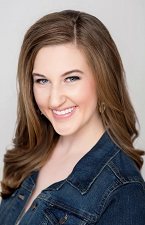 Madison Humphrey is an Honors Media Communication student with quite the story. As
a producer for UT:10 News, the student-run UT news station, this senior has been able tell that story as well
as those of countless students and community members.
Madison Humphrey is an Honors Media Communication student with quite the story. As
a producer for UT:10 News, the student-run UT news station, this senior has been able tell that story as well
as those of countless students and community members.
Why did you choose Media Communication as a major?
Leading up to my desire to be a broadcast journalist, I took a bit of a different
path than others. I used to be very quiet and shy. I had no confidence – I wouldn’t
talk to people. Then I decided I was going to do a pageant so I could build some confidence.
The first time I gave a speech and shared my personal story, people told me I made
an impact on their life. I thought then maybe I could use my voice to help other people
share their stories and change the world. I want to use journalism and the things
I’ve learned here at UT to give other people a voice, to share their stories, to hold
people in power accountable – to ultimately change the world through journalism.
Pageantry is an interesting path to take for a Communication major. What got you interested
in pageants?
I struggled with bullying throughout grade school. That set me up for low self-esteem
and self-hatred. People would call me fat all the time; after a while, all those things
people tell you, you start believing them. I almost lost my life to anorexia nervosa my freshman year of high school and hit a low point in my life. I just didn’t think
it was worth living. Pageantry helped me find the voice I had lost for so many years
and gave me confidence. I knew after competing that I could accomplish any goal I
put my mind to and conquer my dreams.
How did your experience in pageantry direct your career path?
When I gave my first speech and saw how it affected people, that stuck with me. I
wanted to find a career where I could use my voice to make a difference. I want to
give a voice to girls and guys who are going through situations that I went through.
As a journalist, I have to be unbiased; but if I can reach out to them and let them
tell their story, I think we could make a big impact.
You’ve been an anchor on UT:10 News for over a year now. Has there been a story that has particularly touched you?
One of the stories I worked on, the topic didn’t impact me directly, but it really
had an effect on me. I did a story last Fall on President Donald Trump rescinding
DACA. I took it upon myself to research and to learn how it would impact those involved
in the program. You sit down with “Dreamers” whose lives are just a big question mark
right now, and they don’t know what’s going to happen in six months. You hear their
stories, and it’s heartbreaking when someone tells you, “I’m probably going to be
separated from my son if this happens.” You see the emotion – the heartbreak in their
face. Being able to tell their story and do it justice was a blessing.
Has there been anyone at UT that you’ve seen as a mentor and has had an effect on
the way you do these stories?
I don’t think anyone has taken me under their wing as much as Dr. Jackie Layng has.
Jackie has taken me in and shown me everything I know. She cares so much about my
success as a journalist, but she cares even more about who I am as a person. I wouldn’t
be half the journalist I am today without her guidance and support!
Zehra Mehdi
Medical school is a goal with a typically set path for undergraduates. Some students,
like Honors junior Zehra Mehdi, take a more unconventional route. A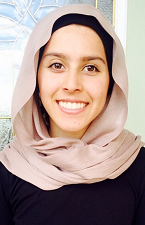 Psychology major with her sights set on an M.D., Zehra’s path through the margins
is helping her fight for those lost in that space.
Psychology major with her sights set on an M.D., Zehra’s path through the margins
is helping her fight for those lost in that space.
You’re a Psychology major, but you are aiming for medical school.
Yeah, a lot of people think I’m going into psychology, but that’s not what I’m after.
In medicine, I feel like you should know the body and the mind. Since medical school
teaches you all about the body, I thought first I would learn about the mind.
What kind of medical career are you considering?
There are two options I’m contemplating. First, I would like to go into pediatrics
because I enjoy working with children. Plus, it’s a convenient schedule for the life
I want because you start and finish in the daytime. I have also thought about being
a gynecologist, but it’s not really the lifestyle I want.
Does your Honors thesis focus more on medicine?
My research is based in the Psychology department, but the aim of my work is rather
“medical.” Right now, we have drafted a PowerPoint containing pictures of abuse victims,
showing the general symptoms that mark abuse. We’re collecting that information so
we can get it published for pediatricians to use. In medical school, we’re not taught
signs of abuse. Thus, one pediatrician can say this person has been abused and another
can say they haven’t been. It’s all subjective – there’s no standard text or resource
to use. Since child abuse is such a common thing, you’ve got to wonder why.
Was there anything that made you focus on this topic?
I joined this lab because it’s something we ignore too often. I felt if I do go into
pediatrics, this is something I’m going to come across and I will need to know that
information. Last year, when I attended the National Conferences on Undergraduate
Research, we presented the correct way to interview a child sexual abuse victim so
as to not lead them in any direction, allowing for accurate responses.
You founded a P.E.A.C.E. Project chapter here at UT. Can you tell us about that?
I’ve been a member since high school. We would go weekly to elementary schools to
talk to those impacted by bullying or at risk for drug use. This past year, a few
bullied children under the age of ten committed suicide. We downplay its prevalence
in our society, but it is a big deal, and that’s what this organization is here to
fight. It started in 2007 with about ten people, and now I’m proud to be among the
1200 advancing its cause.
Pamela Steider
Senior Pamela Steider originally wanted to be a veterinarian when she arrived at UT,
but through various opportunities available through the Honors College, her passion
took a turn towards research. From working in labs to studying abroad in different
countries, Pamela has crafted an impressive 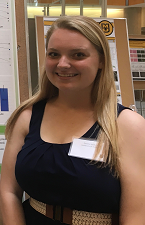 college career as she begins her focus on a Master’s degree in Biology with a focus
in ecology!
college career as she begins her focus on a Master’s degree in Biology with a focus
in ecology!
What inspired you to study abroad?
My parents studied abroad when they were in college, and I really love to travel,
so any opportunity I was given I took.
You traveled to the Galapagos Islands last year. What was that experience like?
The Galapagos Islands are an ecosystem in slow decline. As a Biology major, I wanted
to go and see the environment for myself. It was an amazing trip, and I think after
having a tourist mindset the first time around, I’ll be able to immerse myself in
the biology when I travel there again this Spring Break through the Honors College.
Everything is constantly changing, so every trip is a new experience!
Do you see yourself taking other opportunities to travel abroad after graduation?
I hope to do so! I would love to visit all seven continents, to see all of science
that goes into the world.
How has the Honors College helped prepare you for a successful career?
The JSHC has helped shape what I want to aspire to me in my career. I originally wanted
to be a veterinarian, but working with the JSHC, including Dean Appel allowing me
to get involved in her lab’s chemical ecology research, I realized that I had found
my true passion. There really is no limit when it comes to what the Honors College
can do for you!
What has been your favorite thing about attending UT?
There are so many opportunities within the city of Toledo itself! I’ve been able to
volunteer in the local Metroparks and attend events at local venues such as the Stranahan
Theater. It’s pretty remarkable all you can do around the area.
Taylor Shook
Taylor Shook’s plate is a full one, brimming with two majors and a hefty helping of
extracurricular commitments. Between course work, research, tutoring,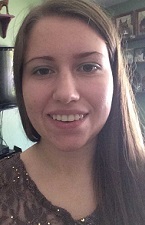 and serving as a JSHC Student Ambassador, every day can be quite the balancing act
for this Honors junior!
and serving as a JSHC Student Ambassador, every day can be quite the balancing act
for this Honors junior!
You’re a Psychology and Biology double-major. What made you combine these two fields?
I’m really interested in how the brain and the mind connect. Psychology gets at the
mental portion of the equation and biology at the neuroscience.
Have you started any research?
I’m doing a lot of psychology research right now. My thesis has to do with childhood
sexual abuse and its physical indicators. When I was reviewing research options, I
heard a lot of good things about my Principal Investigator, so I reached out to see
if she’d be interested in working with me. The topic she proposed is more on the biological
side of things, which is perfect since I’m also an aspiring medical student. I was
considering going into gynecology at the time, so especially considering that path,
my P.I. thought it would be a good project to combine my two majors.
How do you feel the Honors College has helped you as a student?
The JSHC has helped me receive so many opportunities! Even though it may not have
directly been an Honors faculty member that helped me get into research, just being
an Honors student helped open the door. I’ve met so many cool people here. Being a
JSHC Student Ambassador, I’ve assisted with a ton of outreach programs for incoming
freshmen and at Honors alumni events. This semester I’ll be helping out with the UT
Experience Days and the Spring Medallion Ceremony celebrating the accomplishments
of those earning College Honors this semester!
You’re a junior, so you still have some time, but where do you hope to go after college?
I’ve already been accepted into UT’s medical school. Usually you would know that only
at the beginning of your senior year, but I am in the Baccalaureate 2 MD Pathway Program,
so I had my interview last Fall!
Sydney Jones
The Honors College has made me a better community member. Through the JSHC, I have gained the practical skills and a broadened global perspective to launch my career in public service while still in college.
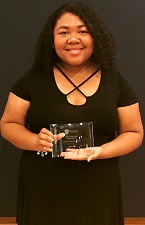 For Sydney Jones, a senior Political Science major with a focus in International Relations,
UT has offered preparation for a career on a global stage. As an Honors student, Sydney
has represented Toledo at multiple conferences and campaigns, on both local and national
levels. With graduation on the near horizon, she has begun looking to what the future
may hold for someone with her variety of experience. We spoke with Sydney about her
plans for the future and some of her favorite accomplishments.
For Sydney Jones, a senior Political Science major with a focus in International Relations,
UT has offered preparation for a career on a global stage. As an Honors student, Sydney
has represented Toledo at multiple conferences and campaigns, on both local and national
levels. With graduation on the near horizon, she has begun looking to what the future
may hold for someone with her variety of experience. We spoke with Sydney about her
plans for the future and some of her favorite accomplishments.
After graduation, what kind of job do you see yourself aiming for?
My dream is to work for the State Department. But over the last year I’ve also gained
an interest in governance, and would like to work in the U.S. Senate someday.
What generated your interest in governance?
Last semester, I received an e-mail from Dean Heidi Appel about the Propel Ohio Collegiate
Leadership Summit, and was fortunate enough to attend. The conference was hosted by
U.S. Senator Sherrod Brown, someone I admire, and focused on childhood poverty. We
met with different speakers to discuss important state issues stemming from childhood
poverty, like the opioid epidemic and food scarcity. We listened to these main speakers
and then moved to breakout sessions, where we discussed the topic in a small group.
The experience made me more aware of state issues and gave me a platform to start
advocacy locally.
What’s been your favorite part of attending UT?
The professors! I took time off from UT for a career opportunity working on the 2016
presidential election for Hillary Clinton. That was an amazing experience, but I was
nervous about losing scholarships and being behind a semester after the election was
over. My professors really rallied behind me and motivated me through the next few
semesters. Their support is a big reason I’m able to graduate on time.
How do you feel the Honors College has helped you reach your goals?
I think it has helped me realize that I am on the correct career path and that this
is something I want to do with my life. The courses in the Honors College open your
eyes to the outside world and give you perspective. My first Honors course, taught
by Dr. Mary Beth Wetli, was tough and really challenged my writing and thinking. But
by the end, I felt like I came out of it a better student and community member.
Gabrielle Huff
Honors staff are in a rank of their own due to their unmatched dedication and passion.
There is nowhere else you can find a group of such enthusiastic and intelligent faculty.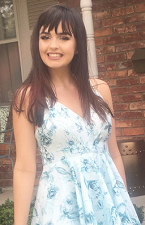
Coming out of high school, choosing a major can be difficult. Deciding what you want to do with the rest of your life can scare even the bravest student back to their dorm. JSHC freshman and Communications Intern, Gabrielle Huff, has adopted a hybrid approach. A Political Science and Media Communication double major, she has combined the two fields to make her college experience her own. We sat down with Gabrielle to discuss her choice in majors and how she wants to turn them into a career.
What drew you to your majors?
In high school, I studied Media Arts. We had a news broadcast every day, doing similar
tasks to what I do in this internship now, and I’ve always enjoyed that. I am also
fascinated by politics. When I was in high school, I merged the two by creating political
news segments. I think I want to be an attorney, and Political Science is a foundation
I can use to go to law school. If I decide not to, though, I’ll still have another
degree on which to rely.
What are your goals for college and beyond?
After I get my Bachelor’s degree, I’m not sure if I want to go to law school or graduate
school – or whether I’d attend UT or elsewhere. I hope UT will help me find what I
want to do in my career.
How is the Honors College helping you choose a path?
The Honors College has helped me figure out the level of work I can do. Honors classes
are little harder, so you have to push yourself and set a higher standard.
Gabrielle will continue her Honors work as a content contributor for The Medallion and the JSHC’s social media streams.
Seth Hasler
The Honors College faculty is full of faculty and staff who care about their students and their goals. I’ve never been more appreciative of this as I am now, working on projects outside of my major.
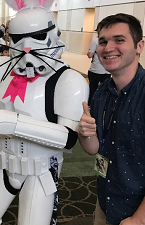 Taking on the complex issue of poverty can be quite the task. However, JSHC student
Seth Hasler is undertaking an exploration of the subject matter through film. For
his Honors thesis, the junior Media Communication student is working on a documentary
short focused on poverty and the opiate epidemic in the Appalachian region of the
United States. We spoke to Seth briefly about his goals with the thesis project.
Taking on the complex issue of poverty can be quite the task. However, JSHC student
Seth Hasler is undertaking an exploration of the subject matter through film. For
his Honors thesis, the junior Media Communication student is working on a documentary
short focused on poverty and the opiate epidemic in the Appalachian region of the
United States. We spoke to Seth briefly about his goals with the thesis project.
Poverty and the opioid epidemic are issues that speak to many people in the U.S. and
across the globe. Why focus on Appalachia?
To start, I grew up in Appalachia, so I have a bit of a personal connection to the
people and the culture. But it’s also a region that is regularly left out of the conversation.
It might be a big story come election season, but after that the issue hardly garners
a whisper. The magnitude of the opioid epidemic in Appalachia speaks to the region’s
economic status, which in turn speaks to the condition of the country as a whole.
I have covered some of this in my coursework already, but I’d love to keep the conversation
going with my thesis.
Outside of completing the thesis, what are your expectations in creating this film?
In 2016, north and central Appalachia garnered particular attention for their designation
as ‘Trump Country’ – but I want to sustain the discussion outside of an election year.
My work may not be the most groundbreaking, but if I can bring the conversation to
a greater audience and keep it going, I’ll consider the film a success. The more the
issue is in the public eye, the more that will be done.
Seth will continue telling others’ stories as a contributing writer to The Medallion, helping introduce inspiring Honors students, faculty, staff, and alumni to the UT community each week
Blaine Luszcak
My favorite Honors staff member is Josh Martin. I’ve known Josh since I was a freshman when he taught my Philosophy 1010 class, which I greatly enjoyed. He transitioned into the JSHC and to this day he is still there to guide me. I really appreciate it.
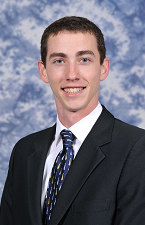 Having just finished his chapter within the Jesup Scott Honors College, senior Blaine
Luszcak says the unique opportunities provided by Honors first drew his attention.
“I heard good things about the community I would be joining as an Honors student,”
the Computer Science and Engineering major said. “I wanted to have access to networking
and extracurricular events not easily available otherwise.”
Having just finished his chapter within the Jesup Scott Honors College, senior Blaine
Luszcak says the unique opportunities provided by Honors first drew his attention.
“I heard good things about the community I would be joining as an Honors student,”
the Computer Science and Engineering major said. “I wanted to have access to networking
and extracurricular events not easily available otherwise.”
During this last year at UT, Blaine received a U.S. Department of Energy grant to participate in a competition called the “Solar in Your Community Challenge,” which he cites as his standout achievement. “Through the grant co-written by myself and another Honors student, Evan Nichols, we received $60,000 in seed funds to put solar panels on low-to-moderate income housing in Toledo and are competing for the $500,000 grand prize,” he said.
Looking back on his four years at UT, Blaine says his Honors experience has been a crucial part of helping him grow personally and academically within his major. “I think the Honors College helped me seek different avenues when problem-solving,” he said. “As an engineer, you rely heavily on being able to solve complex problems, but working with other highly motivated Honors students helped me to think differently,” he explained. “I greatly enjoyed going to plays with other Honors students, volunteering for Jesup Jam, and going to lectures that I otherwise would have missed.”
Emily Grubbs
My standout Honors instructor has been Professor Shelley Cavalieri. Her seminar, “Human Rights and International Development,” was the best Honors course I have taken. It involved the kind of critical thinking, passion, and insight that I will take with me from my JSHC experiences.
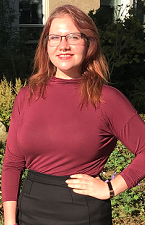 “My coming to UT was contingent on my participation in the Honors College,” said Emily
Grubbs, a senior Honors student. “When I visited campus for the first time, it was
for an Honors event – so my UT experience has always been intrinsically connected
to the JSHC.” A double major in English Literature as well as Law and Social Thought,
Emily was attracted to the small class sizes, opportunities for experiential learning,
and other resources the Honors College provides. “Now, coming to the end of my undergraduate
career, I’ve taken advantage of all of these resources with ample support from the
JSHC,” she said.
“My coming to UT was contingent on my participation in the Honors College,” said Emily
Grubbs, a senior Honors student. “When I visited campus for the first time, it was
for an Honors event – so my UT experience has always been intrinsically connected
to the JSHC.” A double major in English Literature as well as Law and Social Thought,
Emily was attracted to the small class sizes, opportunities for experiential learning,
and other resources the Honors College provides. “Now, coming to the end of my undergraduate
career, I’ve taken advantage of all of these resources with ample support from the
JSHC,” she said.
Emily has been working on her Honors thesis since her sophomore year, something in which she takes great pride. “I set ambitious research goals for my thesis and, once approved, collected my own, unique data,” she explained. “Since the beginning of my work, the JSHC has funded two presentations of my work. I was privileged to travel with fellow Honors students to Memphis and present at the National Conferences on Undergraduate Research earlier this year. I also presented my thesis in Philadelphia at a conference specifically about my research topic. My thesis advisor and the Honors College have supported me through the most difficult and rewarding academic pursuit of my life thus far.”
Emily has spent this semester in Washington, D.C., interning through the Washington Center Program with Amnesty International USA’s Gender, Sexuality, and Identity Program. “During these few short weeks, I’ve partnered with Amnesty International’s Board Members to lobby congressional offices for our priority human rights campaigns,” she explained. “I cannot express how amazing this experience has been – easily the most significant professional opportunity of my undergraduate career.”
As her journey within the Honors College comes to a close, Emily reflects on the impact the JSHC has had on her. “I would say, first and foremost, the Honors College has allowed me to shape myself, giving me the ability to chase my most radical academic goals,” she said. “It has endlessly fed my hunger for learning.”
Brianna Becraft
When I first toured MacKinnon Hall and saw that the professors worked in the residence hall, I knew that there was a close connection between the Honors faculty and their students. I live in MacKinnon now and have since freshman year – I love that the space is available for us.
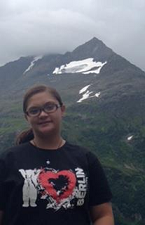 Few aspects of junior Brianna Becraft’s collegiate experience have gone unenhanced
by the Honors College. A Paralegal Studies major, she notes, “The Voice of Honors
has had nights where law students and lawyers come in and talk about their experiences,
helping me decide what I want my future to look like.” She added, “the Honors curriculum
has provided me with advanced English classes that improved my critical thinking,
discussion, and writing skills – all which will benefit me in law school and in life.”
Few aspects of junior Brianna Becraft’s collegiate experience have gone unenhanced
by the Honors College. A Paralegal Studies major, she notes, “The Voice of Honors
has had nights where law students and lawyers come in and talk about their experiences,
helping me decide what I want my future to look like.” She added, “the Honors curriculum
has provided me with advanced English classes that improved my critical thinking,
discussion, and writing skills – all which will benefit me in law school and in life.”
As the secretary of Alpha Psi Lambda National Inc. and President of the Multicultural Greek Council, Brianna is passionate about working to improve inclusion and cultural competence at UT. “Before I came to UT, I had always been in schools and cities that were predominately white. I am half Hispanic and joined a Latino-based co-ed fraternity at UT that has taught me so much about my culture,” she explained. “I later became President of the Multicultural Greek Council and have attended workshops, conferences, and discussions about how to improve inclusion on campus. Watching my and other students’ ideas come to life and help others has been the most rewarding thing I have experienced thus far.”
On a personal level, Brianna says the Honors College and the relationships she has made within it have played a huge role in her college years so far. “I had the pleasure of being in Dr. Page Armstrong’s HON 1010 class during my first semester here at UT. She took me under her wing and worked to get me involved and comfortable here on campus. She also cultivated my academic abilities in HON 1010 and 1020 through deep discussions that I will remember for the rest of my life,” she said. “My Success Coach, Eric Gullufsen, has been there for me through class selection, improving my time management, and through some difficult times. All of the Honors staff is amazing – I don’t know where I’d be without the JSHC!”
Isaac Petkac
My favorite Honors faculty member is Catherine Chengges, my HON 1010 instructor. She does an excellent job of incorporating literature into everyday life and collaborating with students during every class.
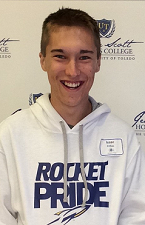 The transition from high school to college is made easier when you get involved on
campus, something first-year Honors student Isaac Petkac can speak to directly. Isaac,
a Media Communication major, is an active member of organizations such as the Jesup
Scott Honors College Communications team and the student-run radio station WXUT. “My
biggest accomplishment so far here at UT would be taking over play-by-play broadcasting
duties at WXUT,” he said. “I have broadcast football games this semester and am looking
forward to calling basketball and baseball in the spring!”
The transition from high school to college is made easier when you get involved on
campus, something first-year Honors student Isaac Petkac can speak to directly. Isaac,
a Media Communication major, is an active member of organizations such as the Jesup
Scott Honors College Communications team and the student-run radio station WXUT. “My
biggest accomplishment so far here at UT would be taking over play-by-play broadcasting
duties at WXUT,” he said. “I have broadcast football games this semester and am looking
forward to calling basketball and baseball in the spring!”
Issac says he initially chose UT for the well-regarded Communication department and the diverse campus life. “I also saw that the Honors College has a variety of opportunities that interested me, which is why I applied,” he said.
During his first semester at UT, Issac has been able to integrate his Honors education into his specific areas of study. “As a Media Communication major, I relish the opportunity to improve my spoken communication with Honors professors and other professionals,” he explained. “I would encourage other Honors students to get involved! From our Social Media Team to The Voice of Honors and more, the JSHC offers a variety of opportunities for all students.”
Alexis Wei
My favorite Honors staff member would have to be Josh Martin. He is one of the most approachable, kind-hearted, and caring individuals I know at The University of Toledo!
Alexis Wei joined the Honors College for a gateway to opportunities, a chance to focus
her interests, and to be challenged. “The Honors College has given 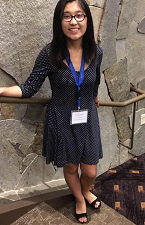 me opportunities that I otherwise wouldn’t have – research, personalized classes,
Honors advising, and Honors trips,” she said. A junior in the Pharmacy program, UT’s
strength in those areas and its sense of community and inclusiveness appealed to her
as a college applicant. Alexis is a P1 Pharmacy student in her first year of the Pharmacy
professional division.
me opportunities that I otherwise wouldn’t have – research, personalized classes,
Honors advising, and Honors trips,” she said. A junior in the Pharmacy program, UT’s
strength in those areas and its sense of community and inclusiveness appealed to her
as a college applicant. Alexis is a P1 Pharmacy student in her first year of the Pharmacy
professional division.
Alongside her academic achievements, Alexis is heavily involved around campus, fulfilling leadership roles in multiple organizations. She serves as the treasurer of the Vietnamese Student Association, volunteer chair of the Filipino American Association, a JATO Leader, a volunteer tutor for Student Outreach and Support, and is involved in Levis Leadership. Alexis says that her leadership and involvement have been a key component of her collegiate career. She is also a member of the Honors Learning Community, the Foodie Club, as well as the Pharmacy organizations Student National Pharmaceutical Association and Student College of Clinical Pharmacy.
Alexis says the Honors College has played a significant part in shaping her college experience, whether it was taking a class that changed her perspective or making connections. “Through the JSHC and the Honors Learning Community, I’ve made close bonds with advisers and faculty while meeting many of my closest friends at UT,” she said.
Eanas Abutaha
“The Honors College has enriched my interests by providing countless opportunities for social impact, positive influence, and personal creativity.”
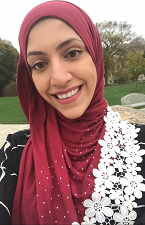 Eanas Abutaha says that if there is one thing to know about her, it is that she loves
to challenge herself. “After graduating as valedictorian from my high school, I knew
that I wanted to continue fulfilling every fraction of my potential,” the sophomore
Honors student said. “I felt that the Jesup Scott Honors College was the door to just
that!”
Eanas Abutaha says that if there is one thing to know about her, it is that she loves
to challenge herself. “After graduating as valedictorian from my high school, I knew
that I wanted to continue fulfilling every fraction of my potential,” the sophomore
Honors student said. “I felt that the Jesup Scott Honors College was the door to just
that!”
Eanas is a Biology major with a concentration in Pre-Dentistry, something that she passionately pursues through research at UT. “I was offered a stipend by the Office of Undergraduate Research last summer. I have committed over 500 hours to understanding and determining the gene expression of IL-17 and IL-23 in radiotherapy-induced Oral Mucositis and gave a presentation at the End of Summer Research Symposium,” she explained. “Now I am training incoming undergrads on different lab duties and procedures while working on another research project in Dr. Heather Conti’s lab.”
As an Honors College Ambassador, the Secretary of Phi Eta Sigma, a tutor for the UT Chapter of the Syrian American Medical Society, and an Appointed Senator in Student Government, Eanas has truly used her drive to make a difference in her field of study and at UT. “The Honors College has not only provided me with an atmosphere of highly motivated students and supportive faculty, but has also offered me countless opportunities,” she said. “It continues to enhance my overall Rocket experience.”
Toriano Drane
“My favorite study spot in MacKinnon Hall is the room across from Dr. Mann’s office with the huge television and multiple couches. It is always dead silent and allows me to focus on my studies.”
Toriano Drane, an Honors student studying Business, recognized the benefits of the
Honors College even before applying to it as a current student. “What 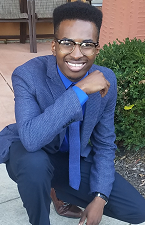 piqued my interest in joining were the extended opportunities given to Honors students,”
he said. “I wanted to connect with others possessing the same academic drive as myself.”
piqued my interest in joining were the extended opportunities given to Honors students,”
he said. “I wanted to connect with others possessing the same academic drive as myself.”
A junior, Toriano has secured an upcoming internship with Ernst & Young in Toledo and has served as President of Campus Activities and Programming, one of the largest organizations on campus. “It took a lot of confidence to go through with taking that opportunity,” he explained. “It has since provided me with a plethora of benefits, meeting many new people and making long-lasting connections.”
Since joining the JSHC nearly three years ago, Toriano says that his Honors education has contributed notably to his success. “The Honors workload has made me more self-sufficient by managing my time efficiently,” he said. “I strongly encourage students to enroll in the Jesup Scott Honors College, mainly because it helps you develop into the ‘ideal college student.’ I notice that when employers see my résumé, they always speak highly of me solely based on my enrollment in Honors.”
Shhreyaa Mande
“The Honors staff has been so approachable since the beginning, making my transition to America smooth and easy.”
 A junior in Political Science, Honors student Shhreyaa Mande has had quite the adjustment
coming to UT. As an international student from India, choosing the right university
was a decision she took very seriously. “When I came across The University of Toledo,
the professors in my department, internship opportunities, and the healthy environment
really caught my attention,” she said.
A junior in Political Science, Honors student Shhreyaa Mande has had quite the adjustment
coming to UT. As an international student from India, choosing the right university
was a decision she took very seriously. “When I came across The University of Toledo,
the professors in my department, internship opportunities, and the healthy environment
really caught my attention,” she said.
Shhreyaa is a member of the Political Science Students Association and the International Students Association. She is also an active participant in many Honors events, such as trips to the Toledo Symphony and Art Museum. This kind of involvement is what Shhreyaa says has helped her grow at UT. “I have been exposed to so many opportunities within and outside my field of study,” she explained. “All the credit goes to UT, and even more so the Jesup Scott Honors College because they have given me the chance to be a part of these amazing activities.”
Only halfway through her journey at UT, Shhreyaa is hopeful that other international students can benefit from the Honors College in the same ways she has. “I believe the Honors College has been an integral part of changing me as a person,” she said. “The love and support of the Honors professors, particularly Dr. Page Armstrong, my Success Coach, and my fellow peers keep me motivated to excel in everything that I do. Whether I have a question about registration, need help with an essay, or am feeling homesick, everyone has been so helpful. Going forward, I hope to give the same love and warmth to my fellow and future Honors students so that they feel at home here at UT.”
Lauren Bahonsua
“With the Honors College, I have been able to make the most of my experience at UT. I am constantly surrounded by Success Coaches, other mentors, and fellow students that I could always go to for personal or professional advice.”
Lauren Bahonsua, an Honors Pharmacy student and junior, has keenly felt the benefits
of an Honors education during her time at UT. “My interest with the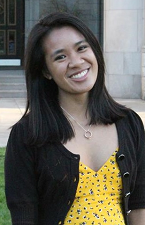 university started with the College of Pharmacy,” she said. “I joined the JSHC to
provide myself with the resources I need for a successful academic career.”
university started with the College of Pharmacy,” she said. “I joined the JSHC to
provide myself with the resources I need for a successful academic career.”
Through her studies and involvement on campus, Lauren says that the development of her leadership skills has been her greatest accomplishment at UT. “For most of my life I’ve felt more like a follower than a leader, but after joining the Honors College, I was able to step out of my comfort zone,” she explained. Lauren has been involved in organizations such as the Honors Learning Community, Foodie Club, and the JATO Network, and has attended the JSHC Distinguished Lecture Series and the Honors trip to Cedar Point. “Thanks to the Honors College, I have become more active with organizations around campus, volunteered at events, and took on leadership positions that have allowed me to grow as a person,” she said.
As an out-of-state student who had a hard time adjusting to a new place, Lauren says that the JSHC and the experiences she shared with her Honors peers was a key factor in making UT feel like home. “The Honors College provided me with a community of people I can depend on,” she said. “Whether we were going to Cedar Point or staying up until midnight together for a stressful evening of registering for classes, it was so helpful to be surrounded by a group of students like myself.”
Jenna Bedrava
“My Honors classes are student-led, which makes a huge difference for me. They give me the opportunity to hear from a lot of different perspectives rather than just my professor’s.”
 Jenna Bedrava, a sophomore Honors Student, set her sights on UT because of her chance
to make an impact. When she did, she not only chose Mathematics with a concentration
in Actuarial Science, but she also opted for the Jesup Scott Honors College. “I wanted
to push myself academically like I had in high school,” she said. “I felt at home
and knew that I could make more of a difference here than at a larger school.”
Jenna Bedrava, a sophomore Honors Student, set her sights on UT because of her chance
to make an impact. When she did, she not only chose Mathematics with a concentration
in Actuarial Science, but she also opted for the Jesup Scott Honors College. “I wanted
to push myself academically like I had in high school,” she said. “I felt at home
and knew that I could make more of a difference here than at a larger school.”
As a member of a number of campus organizations, Jenna has strived to make an impact and get involved. She has joined Alpha Phi Omega, a community service-based fraternity, Chi Omega, a women’s social fraternity, Active Minds, a mental health awareness organization, and is a Team Leader for Liftoff UT. “I came to Toledo to make a difference, whether in the lives of one person or an entire organization,” she explained.
Through these groups, Jenna has worked towards causes such as helping the homeless in Toledo, raising money for cancer research and the Children’s Miracle Network, promoting mental health awareness on campus, mentoring incoming first-year students, and aiding the Northwest Ohio Make-A-Wish Foundation. “Being active on campus has been such a great way to meet people that share the same values and goals that I do,” she said. “Those I have met here are ones that will be lifelong friends.”
Jenna has too enjoyed the perks of an Honors-style classroom. “I love my Honors courses because they’re so personal and discussion-based,” she added. “I have found that my peers in the JSHC are well-rounded and cultured, which makes the classes insightful and thought-provoking.”
Gabrielle Hymel
“The Honors College has pushed me to be more aware of the needs and wants of others, and it has encouraged me to use critical analysis in my everyday work.”
Gabrielle Hymel, an Honors student and Biochemistry major, fell in love with the University
of Toledo in part due to the Jesup Scott Honors College. “I 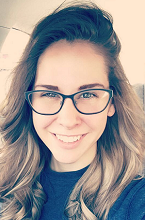 unintentionally joined the Honors College - I checked a box when applying to UT that
said I would like to be considered and received a letter a few weeks later saying
that I had been accepted,” she said. “I have remained in the Honors College because
of the opportunities that it provides, for the Honors lectures, and for the incredible
faculty. Through the JSHC, I have travelled abroad on a Spring Break trip, started
my involvement in undergraduate research, and increased my involvement in the Toledo
community.”
unintentionally joined the Honors College - I checked a box when applying to UT that
said I would like to be considered and received a letter a few weeks later saying
that I had been accepted,” she said. “I have remained in the Honors College because
of the opportunities that it provides, for the Honors lectures, and for the incredible
faculty. Through the JSHC, I have travelled abroad on a Spring Break trip, started
my involvement in undergraduate research, and increased my involvement in the Toledo
community.”
Outside of the classroom, Gabrielle focuses on her passion for student activism, specifically sexual assault prevention and Title IX policy reform. Beginning nearly a year ago, she has been working with multiple organizations to start programs fighting sexual assault culture and to raise awareness of toxic relationships along with the risks of assault. “The project as a whole is likely my biggest accomplishment,” she said. “I helped form a student organization called ‘Rockets Against Sexual Assault,’ was trained to be a OneLove Program Facilitator, have done research on behalf of our Ad Hoc Title IX Committee, pushed Residence Life to now require that RAs bring their residents to at least one program regarding sexual assault prevention/sexual wellness per semester, and am currently working with offices on campus to increase student advocacy as well as awareness of resources.”
The Honors College, Gabrielle says, has been a key factor in the way she views her work and her collegiate experiences. “The curriculum functions on the diversity of our student population and centers on the diversity of our communities,” she explained. “The Honors College has constantly pushed me to be conscious of the impacts of my work.”
Farrah Alarmanazi
"When my sister and I started our own student organization last year, we received great support from the Honors College. Many students and faculty helped out by either volunteering or donating materials.”
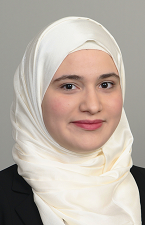 Farrah Alarmanazi, a Biology Pre-Med major and an Honors student, has excelled in
student leadership during her time at UT. Now in her senior year, Farrah says she
chose UT and the Jesup Scott Honors College for the opportunities to get involved
on campus as well as its excellence in academics, research, and student diversity.
“Whether in research, academics, organizations, or faculty, the Honors College always
provides me with the best experience I could ask for,” she explained.
Farrah Alarmanazi, a Biology Pre-Med major and an Honors student, has excelled in
student leadership during her time at UT. Now in her senior year, Farrah says she
chose UT and the Jesup Scott Honors College for the opportunities to get involved
on campus as well as its excellence in academics, research, and student diversity.
“Whether in research, academics, organizations, or faculty, the Honors College always
provides me with the best experience I could ask for,” she explained.
With a resumé listing accomplishments such as being a JATO leader, the Balch Fellowship, neuroscience research, and multiple Outstanding Pre-Med Student Scholarships, Farrah identifies her dearest accomplishment as one that focuses on helping others.
“With the increasing number of refugees in Toledo, my sister Marah and I started an organization last year to assist the refugees educationally, medically, and socially,” she said. Farrah and her sister invite speakers to talk with students about opportunities to get involved on campus and also started a tutoring program for the refugee children. “We were able to win awards on campus such as UT’s ‘Parks Outstanding New Student Organization’ and the ‘Parks Outstanding Service Program.’ In addition, we received funding from other community organizations for our refugee Family Education Program,” Farrah added. “We are growing even further this year with more than 200 members, collaborations with other community organizations, and an English-as-a-Second-Language adult section for the parents, too!”
Ready to take on her senior year as a leader on campus and in the community, Farrah sees the Honors College as a key piece of her collegiate career. “The Honors classroom structure with its small class sizes, always allowed me to express my ideas,” she explained. “Joining the JSHC enhanced my educational and cultural experience beyond my expectations; it encouraged me to challenge myself and work to the best of my abilities.”
Syyeda Mehdi
“One of my biggest passions has always been to be a leader in my community, and the Honors College has encouraged me to do just that.”
Syyeda Mehdi, a junior studying Pharmacy, has a lot of passion for the Jesup Scott
Honors College and how it has impacted her collegiate career. She 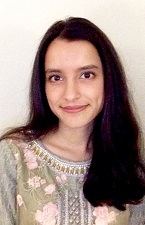 chose UT in the first place because of the JSHC. “Since day one, the Honors College
has been helpful, kind, and always available when I need it,” she said. “It is filled
with faculty and students who are accepting and encouraging.”
chose UT in the first place because of the JSHC. “Since day one, the Honors College
has been helpful, kind, and always available when I need it,” she said. “It is filled
with faculty and students who are accepting and encouraging.”
Syyeda has participated in psychology research and held leadership positions on the executive boards of multiple student organizations. “I served as the Media Officer for the Muslim Student Association and, together with the rest of the executive board, we earned the award for ‘#1 Student Organization at UT,’” she said. Syyeda is currently the president of The Voice of Honors and recently added a community service segment to their weekly Wednesday meetings. Last week, the Voice made PB&J sandwiches for the homeless. In coming weeks, the group is planning to participate in an event helping Syrian refugees residing in Toledo and to partner with the P.E.A.C.E. Project, where they will mentor students who have been bullied. “Serving the community is what UT has always done and I feel that it is only my duty to do the same,” Syyeda explained.
In her three years so far at UT, she has used the benefits and opportunities that the Honors College has given her to help others and make a difference on campus. “The Honors College has allowed me to step out of my comfort zone and join activities that I would have never thought I’d be a part of,” she explained. “I have made several new friends here and I am very thankful for everything it has given me. I would highly encourage students to become active participants in the JSHC; you won’t regret it!”
Luke Gorbett
“My favorite part of the Honors College has been the interaction with other Honors students who have like-minded goals that motivate me to succeed.”
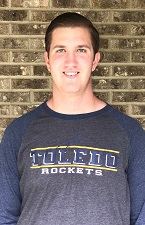 Sophomore Honors student, Luke Gorbett, has reaped the benefits of academic and campus
involvement opportunities during his two years at UT. Luke, a Presidential Scholar
and Chemical Engineering major, chose Toledo for its highly ranked Engineering programs.
“I felt like it would give me the best opportunity to grow both academically and professionally,
especially due to the College of Engineering’s mandatory co-op program,” he explained.
“Once I was accepted into the University, I had no doubt in my mind that I wanted
to join the Jesup Scott Honors College because I wanted to continue to challenge myself
and my way of thinking.”
Sophomore Honors student, Luke Gorbett, has reaped the benefits of academic and campus
involvement opportunities during his two years at UT. Luke, a Presidential Scholar
and Chemical Engineering major, chose Toledo for its highly ranked Engineering programs.
“I felt like it would give me the best opportunity to grow both academically and professionally,
especially due to the College of Engineering’s mandatory co-op program,” he explained.
“Once I was accepted into the University, I had no doubt in my mind that I wanted
to join the Jesup Scott Honors College because I wanted to continue to challenge myself
and my way of thinking.”
About to embark on his first co-op rotation next semester, Luke describes his biggest accomplishment thus far as getting involved in the University of Toledo Engineering Council (UTEC). “I am excited to become more involved in UTEC and potentially join the executive board at some point in my college career,” he said. “By being a member of UTEC, I will be able to positively impact UT’s College of Engineering.”
This past summer, Luke traveled to Europe through funding from the UT. There he visited a multitude of countries including Germany, Italy, France, Switzerland, Austria, the Netherlands, and the United Kingdom. “UT and the Honors College have encouraged me to always take the extra step,” he said. “The JSHC has enhanced my education by providing an environment that genuinely challenges me.”
Jason Gonring
“The Honors College has cultivated my curiosity by connecting me to other students who have a thirst for knowledge and providing me countless opportunities to turn my curiosity into understanding through research and experience.”
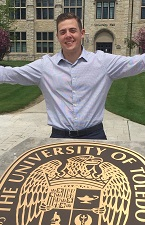 Jason Gonring, a junior studying Electrical Engineering and a Toledo local, knew early
on the opportunities he had and the strides he wanted to make as a UT Student and
member of the Honors College. “In UT, I saw a university dedicated to its students
and to pushing the boundaries of knowledge through research,” Jason explained. “In
the Honors College, I saw great opportunities to get involved in that research and
to enhance my studies with immersive, multidisciplinary learning experiences.”
Jason Gonring, a junior studying Electrical Engineering and a Toledo local, knew early
on the opportunities he had and the strides he wanted to make as a UT Student and
member of the Honors College. “In UT, I saw a university dedicated to its students
and to pushing the boundaries of knowledge through research,” Jason explained. “In
the Honors College, I saw great opportunities to get involved in that research and
to enhance my studies with immersive, multidisciplinary learning experiences.”
With a resumé showcasing involvement in the Honors Student Ambassadors, UT Engineering Council, First Year Rocket Engineers, Ohio’s Sustainable Energy Future, and the Roy and Marcia Armes Engineering Scholarship Institute, Jason has used his time thus far to get heavily involved in his field of study and within the Honors College.
“My greatest accomplishment thus far would have to be the Undergraduate Research Project that I completed for Honors Professors Dr. Barbara Mann and Dr. Page Armstrong, also known as the two ‘Buffalo Girls,’” he said. Jason completed a feasibility study on the use of solar power to supply all of the energy needs for a bison ranch that Dr. Mann and Dr. Armstrong are working to create in the Greater Toledo Area. He also worked to analyze efficient and environmentally safe ranching processes that would maximize animal comfort and minimize financial and environmental costs. “I am very proud of the work I have done and I hope that it proves to be a solid engineering foundation for the Buffalo Girls project,” he explained. “When completed, the Buffalo Girls hope to use the project to provide similar research and internship opportunities to future Honors Students.”
Being a part of the Honors College has not only given him opportunities for academic and leadership advancement, but also relationships with students and faculty that have made quite the impact on his collegiate experience. “Learning from these individuals has given me a variety of lenses through which to see the world. “I am proud to be a part of the great community of leaders, intellectuals, change-makers, and friends that make up the Honors College.”
Celine Schreidah
“The Honors College has allowed me to meet a diverse group of students and given me access to opportunities that have been cornerstones of my collegiate career.”
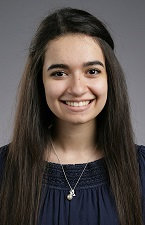 As a proud Toledo native, junior Celine Schreidah has taken advantage of every academic,
leadership, and social opportunity available to her. Celine is a Presidential Scholar
studying Biochemistry on the Pre-Med track, and has a long list of achievements on
campus and in the Honors College. “I grew up under the university’s influence and
admired how closely knit UT is with the city of Toledo,” she said. “I valued that
community connection and wanted to contribute to it during my college years.”
As a proud Toledo native, junior Celine Schreidah has taken advantage of every academic,
leadership, and social opportunity available to her. Celine is a Presidential Scholar
studying Biochemistry on the Pre-Med track, and has a long list of achievements on
campus and in the Honors College. “I grew up under the university’s influence and
admired how closely knit UT is with the city of Toledo,” she said. “I valued that
community connection and wanted to contribute to it during my college years.”
And contribute she has – as President of the UT Student Chapter of the American Chemical Society, Vice President of Communications for The Bridge, an Honors College Ambassador, Vice President of Free Pizza Improv, a tutor for the UT Chapter of the Syrian American Medical Society, and an Award of Excellence Winner for Phi Kappa Phi Honors Society.
Along with her influence on campus, Celine has been making strides nationally. She spent her summer participating in a Harvard University summer research program at Massachusetts General Hospital – an opportunity with a 4% acceptance rate. This distinction was thus statistically harder to earn than admission to Harvard itself! Celine identifies her grandest accomplishment thus far at UT, though, as her success at the American Chemical Society National Conference in San Francisco, a trip the Honors College helped fund. “Our chapter was awarded the Outstanding Student Chapter and the Green Chemistry Awards, both given to the top 5% of chapters nationwide,” she explained. “It was a testament to the hard work we have put in and I was able to present my undergraduate research on the national level!”
Hard work, determination, and the influence of UT Honors has made Celine’s college
career so successful. “The Honors College has encouraged me to be the best collegian
I can be, through intellectual and community development,” she said. “I’ve been pushed
to join discussions and steer conversations in my Honors classes, exploring topics
I wouldn’t have been able to. It’s widened my worldview and shown me the possibilities
for my future.”
Click here For 2024-2025 Honors Student Profiles
Click here For 2023-2024 Honors Student Profiles
Click here For 2023-2024 Honors Student Profiles


